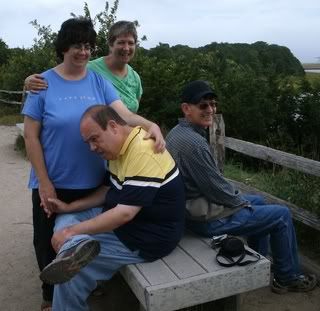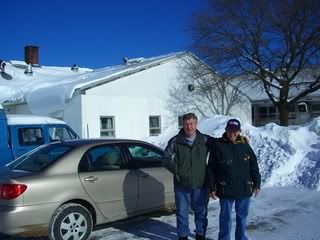Jimmy Holdsworth
Jimmy Holdsworth, 59, is autistic and nonverbal, and has been at Templeton for more than 20 years.
When he was young, Jimmy's parents tried to keep him at home, but his behavior was so volatile and unpredictable that they had to be with him constantly, says Judith Holdsworth, his sister and guardian.
Jimmy's mother and father couldn't go anywhere without him, and yet they couldn't leave him at home either. They had almost no social life and no relief. When his parents were finally able to get him into Templeton, they were already in their 60s. “That was the first positive time I remember for my brother and my parents,” Holdsworth said.
At Templeton, Jimmy gets 24-hour supervision and learned for the first time how to control his impulsive behavior. The staff developed a plan for dealing with his behavioral issues and for other related problems, including his need to lose weight.
Jimmy has participated in a wide range of activities at Templeton, from horseback riding to woodworking. Both of those activities have been discontinued in recent years due to budget cuts. Jimmy's current job at the center is keeping the soda machines stocked.

Jimmy Holdsworth (seated in front) with family members on Cape Cod. Jimmy's sister and guardian, Judith Holdsworth, is in center.
Tony Welcome
Before he was admitted as a resident at Templeton in 1989, Tony Welcome had been in various group homes and programs, including a homeless shelter. Nothing worked for him, says his mother, Bonnie Valade.
Tony, who has a mild intellectual disability, was constantly in trouble. He particularly liked to steal cars and was once coaxed into lighting a fire in an apartment building. Another time, someone persuaded him to stick a piece of burning paper in the gas tank of a vehicle, which luckily didn't blow up.

Tony Welcome
“It's hard to understand how vulnerable he was, that he would do anything anyone wanted him to do,” Bonnie Valade says. “It was his way of fitting in with the so-called normal people.”
In 1987, Tony spent three months in the Worcester County Jail, where he was beaten badly by another inmate, and had to be placed in solitary confinement for his own protection.
Templeton accepted him two years later, and Tony, now 46, has been there ever since. Since his admission to Templeton, he has not had one instance of troublesome behavior, his mother says. She attributes the turnaround to the tight supervision at Templeton combined with the center's relatively remote location, which eliminates many of Tony's previous sources of temptation.
The doors are unlocked in the residence on the Templeton grounds in which Tony lives. Yet, he's never attempted to run away, Bonnie Valade says.
Valade notes that her son has impulse disorder and psychotic tendencies. “In the community system (of care), he would see a psychologist less than once a week,” she said. “He needs that on a daily basis. Here (at Templeton) he meets with two different psychologists two to three times a week.”
Valade said that the staff at Templeton has gotten Tony to understand the necessity of behaving appropriately. “When he starts to slip, they’re on it before it gets out of hand. A lot of people don’t understand,” Valade continued, “that there are a lot of Tonys out there in the community. They don't realize that these people have other issues in addition to their intellectual disability.”
At Templeton, Tony works in the dairy barn, where he cleans up, feeds the cows, and helps in the pasteurization process.
Bobby Shepherd
Bobby Shepherd is 66 and first came to Templeton when he was 15.
Bobby has always been a wanderer, his brother, Tony, says. When he was seven or eight years old, he climbed into a fenced-in area in the neighboring farmer’s yard and was found petting his bull, normally a very dangerous thing to do.

Bobby Shepherd (right) with Tony, his brother and guardian, in front of the dairy barn at Templeton
Bobby is verbal and has a moderate intellectual disability. He can't read or write and doesn't understand the rules of adult social interaction. As he grew older, he would try to make friends with people he'd see on the street, sometimes putting his arm around women he'd never met. As might be imagined, his attentions often got him into trouble.
He’s been at Templeton for more than 50 years and has lived at the Waite Lodge, a two-story farmhouse on the campus, for the past eight to 10 years. There he shares a room on the second floor with a roommate. On the wall by his bed are photos of horses and one of John Wayne, along with framed sketches of him and one of his brothers, done by their mother when they were young.
Food is prepared and Bobby's special dietary needs are monitored by the staff at the Lodge, Tony says. Bobby's medications are administered by a nurse on site.
Tony maintains that at Templeton, Bobby can wander around wherever he likes, in safety. “Everyone knows him here,” he says.

The Waite Lodge at Templeton
At the dairy barn, Bobby puts his arm around Lori Aldrich, his advocate at Templeton. Lori takes him to see movies and takes him horseback riding in the town of Orange, at least 10 miles away, on her own time. “You're my honey,” he says to her.
Bobby is also involved with a number of other residents in a can and bottle recycling program at Templeton, and sorely misses it whenever any of his friends are not available to particpate.
Tony Shepherd is concerned about Bobby's health. He has been experiencing shortness of breath lately and sometimes needs oxygen. If Templeton closes, Tony said, the only place he would consider placing Bobby is in the Marquardt Skilled Nursing facility, which is slated to remain open at the Fernald Developmental Center in Waltham.
One day last fall, Tony said he went to visit Bobby, who seemed out of sorts at lunch in the cafetaria at Templeton. Tony said he asked if the nurse was available, and she was there within two minutes. She checked Bobby's color and vital signs and returned with a wheelchair and took him to the nurses' station. There, more examination showed Bobby had low oxygen and stomach pain. He was treated and kept overnight for observation at the nurses' unit.
Tony Shepherd says he is sure that
kind of immediate medical attention is not readily available in the community system, and will no longer be available to his brother when the high level of care provided at Templeton is eliminated.
It's also unclear what will become of Templeton's extensive farm operation, in which many of the center's residents participate. Shepherd notes that during the summer, feed corn is grown on 1,000 acres of the campus. The milk produced by the cows is processed and packaged in the dairy barn and provided to the center's residents, with the surplus going to local dairy companies. Templeton residents also raise vegetables for the center's dietary department.
As Bonnie Valade sums it up: “I always thought they would keep this place open, that no one could ever be cruel enough to close it. I still can’t even believe it.”
about three unique people who went from misery to happy lives in one special place. Ms. Valade put it so well–who could be so cruel. Governor Patrick–thats who.
<
p>During one of the Governor’s recent speeches he talked about the need for more compassion for people in the criminal justice system, in other words criminals!
<
p>As he presses on with his policy of closing special places like the Fernald and Templeton Centers (and more to follow)–with zero compassion for these disabled people and zero willingness to compromise in any way– he expects we guardians to have more compassion for convicted criminals!
<
p>
Outstanding! It’s great to see three such success stories. These are real people, not just statistical data. They have real handicaps that require the array of care available at such intermediate care facilities. Families need this option. Governor Patrick, take a look at these citizens when you make your budget decisions.
The sucess of these men could only be achieved living in the ICF/MR at Templeton. Shame on anyone including the Governor in proposing to close these facilities. These are only three stories of success: There are many more. What more can family members say or do to get our legislators to listen. These are human beings born with a terrible disability and deserve the best quality of care we can give them, that is the least we can do for them.
It would appear, with a few exceptions, that our elected officials are deaf.
Dear (Dave from Hvad):
<
p>Hello! My name is James Kramer. I am Jimmy Holdsworth’s
brother-in-law. I am married to Elizabeth Dean Holdsworth Kramer.
I am in the picture with Judy, Liz, and Jimmy. Thank you very
much for article. It is excellent. Templeton has been a huge blessing
to the Holdsworth family. It is a wonderful place, and has wonderful
people as staff. It has been a “God-send”, and that is the understate-
ment of the day. It has been a wonderful “Home” for Jimmy for many,
many years. This is not just the opinion of the Holdsworth family. It
is the opinion of every family that I have met that have loved ones at
“Templeton”. Autistic individuals like Jimmy need to have order and
stability in their lives. Just ask the Curt Shilling family. They wrote a
book about their autistic son called “A Special Kind of Different”. Autistic
individuals are very special “children of God” and have very special needs,
and have very special gifts. Jimmy is very happy at Templeton, and he
is valued for being a “great guy”. The Holdsworth family is very happy with
Templeton. Templeton is a “Temple town” as far as I am concerned. It
cares for people with special needs in a special way.
<
p>Templeton is very simliar to the L’Arche Homes that were begun by the
Roman Catholic theologian Jean Vanier. Templeton is a secular state
supported institution, but it is very similiar to the L’Arche Homes for people
with special needs. The L’Arche Home in Toronto, Ontario, Canada was
the place that the Catholic writer Henri Nouwen was chaplain at in the last
years of his life. It is written about in the final books of Henri Nouwen. It is
held in high regard. Templeton is an excellent facility. That is the reason why
I mention it in regards to the excellent L’Arche Homes, that are around the world.
<
p>Templeton also reminds me of the work of the late Rev. Fred Rogers, of Mister
Rogers Neighborhood. Mister Rogers often had young people on his program,
which ran for 33 years on PBS, who had special needs. They were treated with
a high degree of respect in “Mister Rogers Neighborhood”. Templeton is a place
where the staff have made a wonderful neighborhood for those in their charge who
have special needs. Templeton is literally a “little city on a hill”. It has been “letting it’s light shine”. My in-laws love the place. They gave money to make a good sized
community pool for Templeton. I have been a part of the Holdsworth family for over 30 years now, and Templeton in that time has always been a “special” place to the
Holdsworth family. Templeton is in the thoughts and prayers of many people that God will not let the state government “blow it out”. It is “a very special place”.
<
p>Sincerely yours,
<
p>James A. Kramer,
<
p>brother-in-law
to Jimmy Holdsworth